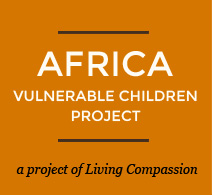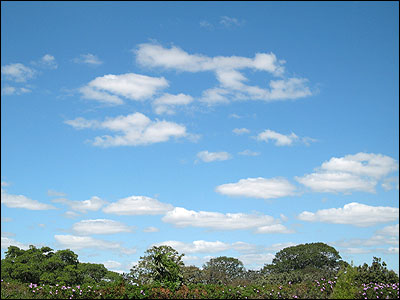
Imagine the most perfect spring day: cool in the mornings and evenings, warm during the day, with a clear, sparkling blue sky and you will have a picture of the weather we’re enjoying here in Ndola. Nights are just right for sleeping, cold enough to almost eliminate the mosquito population (only a few sightings) yet t-shirt warm throughout the day. It’s very dry this time of year so when the wind blows it’s a bit dusty, but nothing the dark glasses we wear against the brightness of the sun can’t handle.
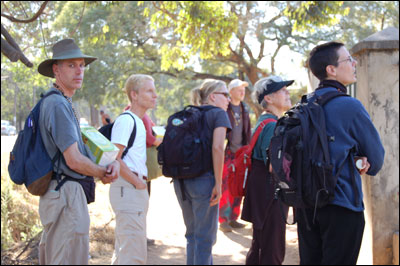
Each day we walk into town for errands (and of course our afternoon stop for tea and internet access at the Savoy). After our first outing Ignatius told us he had received calls from locals saying, “We just want you to know there are white people on their own in town.” Apparently Ignatius responded, “They’re my white people, keep them safe.” And, for the record, for all we can tell we are completely safe. We are encouraged not to go out on our own at night, but we agreed that’s good advice for anyone in any strange city. During the day we walk about with the rest of the foot traffic, greeting and being greeted by the residents, practicing our few words of Bemba, and generally enjoying the ambiance of the city. So far we have not encountered others who seem to be tourists, even at the Savoy which appears to be the nicest hotel in town. (We have speculated that our rooms here at the guest house may be nicer than those at the hotel. We will look into this and let you know.)
Yesterday on our outing we came upon a little girl walking with her family. As she came toward us she was looking down at the ground. When we got a few feet from her she glanced up and a look of amazement passed over her face. “Mazungas!” she called to her mother (“White people!”) Yes, we do stand out in the crowd! And, to a person, the local folks who, as far as we can tell, just don’t see groups of people who look like us have been, helpful, warm, and welcoming. Many times we have been asked, “How are you finding Zambia?” When we answer that we love Zambia the response is often, “Feel welcome.” Those who engage us want to know who we are, where we come from, and why we are in Zambia. As we left Masala Primary yesterday three little boys were looking at a map of the world painted on the side of a building, taking in the distance from the U.S. to Zambia.
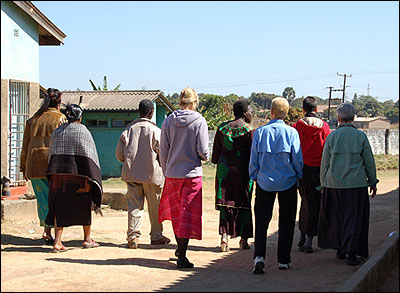
At 15 hours (three o’clock—we have decided to go with “international time” rather than “Zambian time” as Zambian time can turn out to be any time within four or five hours of the specified time) we met with the community-selected committee elected to shepherd the Kantolomba pre-school into existence.
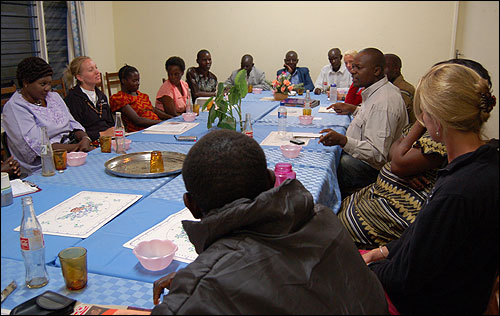
Thirteen members, seven women and six men, joined us around the big conference table at the guest house to discuss their fourteen-point list of priorities. Among those items seen as immediate needs were: a kitchen (a lean-to with a roof that will cover the fire and cooking pots during the rainy season), a door and lock for the newly dug pit latrine, locks for the doors and windows of the school, about sixty feet of pipe to get a source of water (the water is polluted which the people know but they have no choice about drinking it), a cell phone (to reach the larger world in an emergency and to communicate with Ignatius), a post office box (to communicate with Living Compassion), chemicals for the pit latrine, paint for the school, simple school supplies and toys for the children, a security fence around the school, a new tin roof before the rainy season (we were able to see the sky through the current one), a simple office with a bed for a student who gets sick. Additionally the group expressed concern that most of children have only one article of clothing. Since they must wear the same clothes every day laundering that outfit is difficult. If the children had a simple uniform (we think they need two) the whole issue of hygiene in the school would take a giant step forward. They also asked about the possibility of employment, especially for the women. There are four available treadle sewing machines and the women could use those to sew uniforms for the children—and the teachers! There are very few working age men in the compound but those who are there say they would benefit from training in carpentry skills.
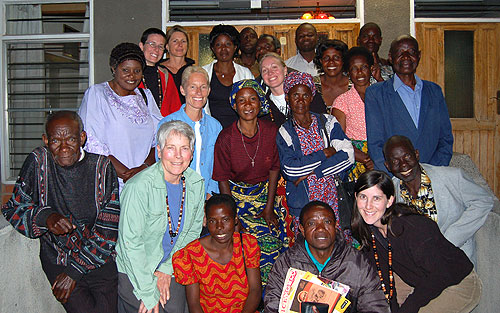
This afternoon we meet with the District Commissioner—more soon.
